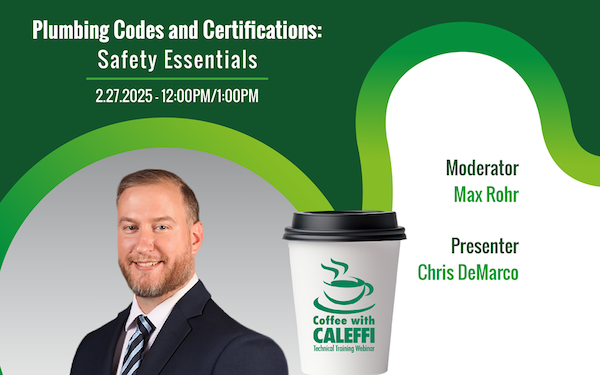https://vimeo.com/1060897936 Usually, what happens in Vegas, stays in Vegas, well, most of the time. The Mechanical Hub team was in Las Vegas for the IBS/KBIS show. Check out this weekly update with some highlights from the show. This Weekly Update is powered by our partners at Milwaukee Tool Read more
HVAC
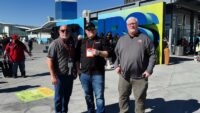
Usually, what happens in Vegas, stays in Vegas, well, most of the time. The Mechanical Hub team was in Las Vegas for the IBS/KBIS show. Check out this weekly update with some highlights from the show.
This Weekly Update is powered by our partners at Milwaukee Tool.

https://vimeo.com/1058459926 Welcome back everyone, we are in the midst of our busy traveling schedule, just returning from the WWETT Show in Indy. We’ll check in from the show with some highlights from our friends from Milwaukee Tool and General Pipe Cleaners. We’ll also visit with Dan Foley, the most recent recipient of the Carlson/Holohan Industry Read more
Welcome back everyone, we are in the midst of our busy traveling schedule, just returning from the WWETT Show in Indy. We’ll check in from the show with some highlights from our friends from Milwaukee Tool and General Pipe Cleaners. We’ll also visit with Dan Foley, the most recent recipient of the Carlson/Holohan Industry Award of Excellence.
This Weekly Update is powered by our partners at Milwaukee Tool.
Atlanta—Celebrating a century of excellence, innovation, and ingenuity, Rheem®, a leader in the water heating and HVAC/R industry, with manufacturing facilities in 88 countries, will showcase the culmination of 100 years of engineering at the 2025 AHR Expo. Rheem’s family of 50 global brands — including Rheem Heating & Cooling, Rheem Water Heating, Eemax®, Friedrich®, HTPG®, IBC™, Nordyne®, and Raypak® — will present Read more
Atlanta—Celebrating a century of excellence, innovation, and ingenuity, Rheem®, a leader in the water heating and HVAC/R industry, with manufacturing facilities in 88 countries, will showcase the culmination of 100 years of engineering at the 2025 AHR Expo. Rheem’s family of 50 global brands — including Rheem Heating & Cooling, Rheem Water Heating, Eemax®, Friedrich®, HTPG®, IBC™, Nordyne®, and Raypak® — will present a range of dependable, cutting-edge, and environmentally friendly product options designed for commercial and residential use.
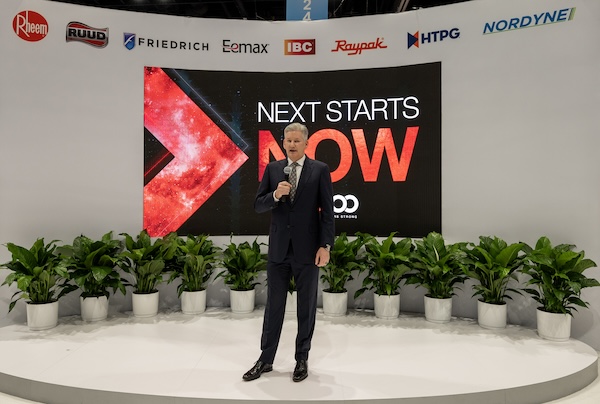
Stop by the RIDGID booth to try out their latest drain cleaning, diagnostic, and pressing solutions ELYRIA, OHIO – February 11, 2025 – RIDGID®, a part of Emerson’s professional tools portfolio, announced their participation in the WWETT Show, Feb. 18-20, in Indianapolis. This year’s in-booth experience will include demos of a new game-changing handheld cordless drain Read more
Stop by the RIDGID booth to try out their latest drain cleaning, diagnostic, and pressing solutions
ELYRIA, OHIO – February 11, 2025 – RIDGID®, a part of Emerson’s professional tools portfolio, announced their participation in the WWETT Show, Feb. 18-20, in Indianapolis. This year’s in-booth experience will include demos of a new game-changing handheld cordless drain cleaner, along with their latest underground technology and pressing solutions, an exclusive show meetup for industry pros with the chance to win one of three RIDGID tools, and the first chance to enter to win a spot at the 2025 RIDGID Experience.
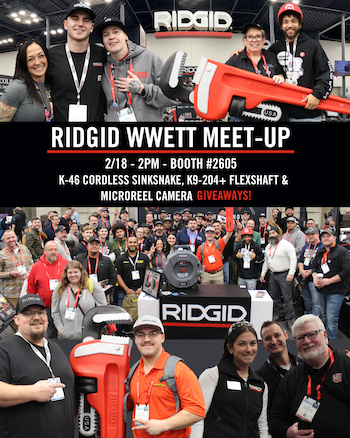 “WWETT will be the first place to experience our new K-46 Cordless SinkSnake™, a handheld drain cleaner that features an industry-first integrated, multi-position kickstand that alleviates the challenges of working under cramped vanities and in tubs,” said Jeff Albertini, product management director, underground technologies and licensing, RIDGID. “It’s been designed to significantly improve ergonomics when drain cleaning in sinks, tubs, vanities, and showers and our team is excited to be able to share it with those attending WWETT.”
“WWETT will be the first place to experience our new K-46 Cordless SinkSnake™, a handheld drain cleaner that features an industry-first integrated, multi-position kickstand that alleviates the challenges of working under cramped vanities and in tubs,” said Jeff Albertini, product management director, underground technologies and licensing, RIDGID. “It’s been designed to significantly improve ergonomics when drain cleaning in sinks, tubs, vanities, and showers and our team is excited to be able to share it with those attending WWETT.”
Along with the K-46, RIDGID invites tradespeople to stop by the RIDGID booth (#2605) to experience their other drain cleaning, inspection, pipe rehabilitation, and pressing tools, including these latest solutions:
o NEW SeeSnake® microDRAIN APX CSx Via™ System – This kit features the SeeSnake microDRAIN APX, an inspection camera ideal for small pipes and tight turns with a flexible push cable and compact camera head to navigate small-diameter pipes, p-traps, and narrow bends where other systems struggle. Equipped with TruSense® technology and auto-image rotation, this inspection camera provides bright, clear images with real-time angle and orientation feedback. Paired with the CSx Via, the system offers a flexible, bring-your-own-screen solution to stream, capture, and share inspection images.
o FlexShaft® KM-1004 Milling Machine – This innovative hybrid milling machine provides heavy-duty milling and a wall-to-wall clean on 1 ¼ to 4-inch pipe up to 80 feet with unmatched efficiency. With cordless freedom, plug-in capability, first ever FlexShaft cable counter, and best-in-class durability, the FlexShaft KM-1004 Milling Machine allows users to adapt to tough jobsite conditions and makes in-field serviceability effortless.
o SeeSnake Mini Pro Inspection Camera with TruSense Technology – The first reel of its kind to provide digital self-leveling without mechanical rotation to maximize uptime, the small, yet rugged Mini Pro is designed to inspect up to 200 feet of 1 ½ to 8-inch pipe with its mid-flex push cable that can navigate hard 90-degree bends. Its innovative 25 mm digital self-leveling camera head always keeps the in-pipe image upright and, when paired with a TruSenseenabled monitor, the Mini Pro delivers the industry’s best in-pipe image with superior clarity, detail and fewer blown-out areas and sections of the pipe that are too dark to see.
o K-4310 FXP™ Drum Machine – The K-4310 features an industry-first cable counter that provides real-time, in-pipe cable distance in 3 to 10-inch lines for faster locating and diagnostics. Ideal for residential and commercial plumbing and drain cleaning projects, its powerful brushless DC motor spins at 230 RPM allowing you to tackle tough jobs with less required maintenance. The battery-powered K-4310 is also the newest addition to the FXP Technology Platform, delivering cordless freedom and powerful performance.
Other RIDGID drain cleaning, diagnostic, and press tools will also be available for demo including sectional machines, drum machines, jetters, SeeSnake® camera systems and locators.
Along with product demos, RIDGID is hosting a booth meetup on Feb. 18 at 2 p.m. where industry pros will have the chance to win a K-46 SinkSnake™, K9-204+ FlexShaft® Drain Cleaning Machine or microDRAIN APX and Via Kit. Additionally, the first day of the show will kick off the RIDGID Experience 2025 and the RIDGID WWETT booth will be the first opportunity for attendees to enter for their chance to win a spot on the eighth annual, all-expenses-paid trip to RIDGID headquarters. Throughout the show, attendees can also scan their badge to enter to win one of three K9-102+ FlexShaft Drain Cleaning Machines.
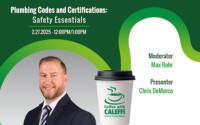
Thu, Feb 27, 2025 12:00 PM – 1:00 PM CST Register here: https://register.gotowebinar.com/register/6255693841565296736?source=evite1 Coffee with Caleffi™ Complimentary Technical Training Webinar Plumbing Codes and Certificates: Safety Essentials Technical Content Level: Fundamentals Join us for the first Coffee with Caleffi of the year, featuring Chris DeMarco, Regional Field Manager for IAPMO in the Mid-Atlantic region. In this Read more
| Thu, Feb 27, 2025 12:00 PM – 1:00 PM CST |
Register here: https://register.gotowebinar.com/register/6255693841565296736?source=evite1
Coffee with Caleffi™ Complimentary Technical Training Webinar
